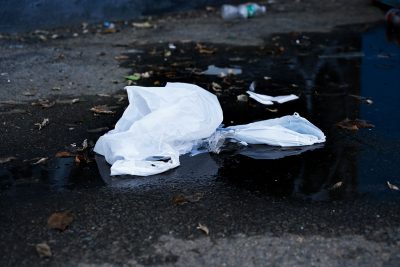Recent health concerns surrounding COVID-19 prompted Gov. Charlie Baker to implement a temporary statewide ban on reusable shopping bags Wednesday. Boston had lifted its ban on plastic bags the same day, effective while the City is in a public health emergency.

Mayor Marty Walsh said in a news conference Wednesday that at this point, the priority is simply to allow people at the supermarket to get their produce and go home without concern over what may be lurking on their reusable bags.
“I think that it’s a short period of time we’re lifting it for,” Walsh said. “At some point, when we hopefully get back to normal here sometime in the future, it’ll go back into effect. It’s just the ability to get people in and out of the store as quickly as possible.”
Janet Domenitz, executive director of the Massachusetts Public Interest Research Group, said while there is no notable evidence that banning reusable bags would play a significant role in lowering chances of transmission, such temporary measures are to be expected.
“We are in unprecedented times right now, and I think that our local and state authorities are acting out of an abundance of caution, because the spread of this disease is just unpredictable and frankly dangerous,” Domenitz said. “At the same time, most Bay Staters, I believe, agree that single-use plastic is a source of waste and litter.”
The use of plastic bags presents a host of environmental problems, making it an issue often tackled by researchers and sustainability advocates.
Plastic is created from fossil fuels and thus emit greenhouse gases as they degrade, according to the Center for International Environmental Law.
Domenitz also said single-use plastics form “a pile of problems,” which is why MASSPIRG has worked to reduce their usage.
“They create litter in our environment, in our parks, in our playgrounds, in our streets, in our trees,” Domenitz said.
These bags are not easily recycled, either, as they often clog machines at recycling facilities. Most curbside recycling programs do not accept plastic bags. This means that ultimately, most of them end up scattered throughout the environment as waste.
“They are contributing to clogging up the oceans,” Domenitz said, “which some marine biologists say are going to have more plastic than fish by the year 2050 if we keep using and disposing of single-use plastics.”
For those worried about touching reusable grocery and retail bags but don’t want to switch to disposable plastic ones, Domenitz said there are other ways to shop sustainably.
One of her neighbors, for example, has opted to head to the store with a cooler in her backseat. After shopping, she would roll her cart out to her car and move the items into her cooler before returning the cart.
“She dreamed up an easy and ingenious way to not use any bags, and of course coolers are easy to just wipe down and disinfect if you’re concerned about that,” Domenitz said. “So that seems super smart to me.”
Leni Fried is the creator of the BagShare Project, a community of volunteers in Massachusetts that sews reusable bags to donate. The project had halted its work in the wake of Baker’s reusable bag ban.
The purpose of launching an initiative to share more bags, she said, was to mimic the idea that all people have a shared responsibility to the planet. Fried said she believes plastic bags should be banned worldwide under normal circumstances, but that the current state of crisis warrants an exception.
“We’re in a situation right now where everyone’s trying to prevent the spread of the virus. And so, my feeling there is that’s okay,” Fried said. “I’m not happy about it but at the same time I think this is such an unusual situation, I haven’t even begun to form my thoughts on what I think.”
What the BagShare Project is recommending in the meantime, Fried said, is for shoppers to skip using bags altogether and place everything back into their grocery carts after checkout, then transport the cart back to their car and pack the products in.
Drew Grande, clean energy program director of the Massachusetts Climate Action Network, said if the pressing concern is what may be going onto reusable bags, people should also remember supermarket employees are still touching disposable plastic bags — and they are an at-risk group.
“The bags that they’re handling are just as vulnerable,” Grande said. “Instead of banning reusable bags and switching everyone back over to disposable plastic bags, you could instead ask people to wipe down and clean their bags before leaving for the store and when coming back.”
Grande said MCAN is currently looking at several other public policy measures that will have a “much bigger impact” on public health than banning reusable bags.
Baker sent out a letter on Wednesday deeming construction an essential service that should continue operating. The City of Boston, however, extended its own construction moratorium until further notice a few hours later.
State guidelines mandate employees comply with social distancing when possible, but in cases where close proximity is inevitable, workers will be supplied with personal protective equipment.
“[Baker is] suggesting that construction workers wear personal protective equipment like gloves, masks and face guards at the same time that we’re experiencing extreme, extreme shortages in hospitals,” Grande said. “So he’s asking that we divert those limited supplies to construction workers. That right there seems very short-sighted.”
Among other policies that Grande believes would improve public health, he said, is paid sick time for all employees while the epidemic is ongoing.
“Those are two things that I think would have a much bigger impact than going back to using single-use disposable plastic bags,” Grande said.




























































































































